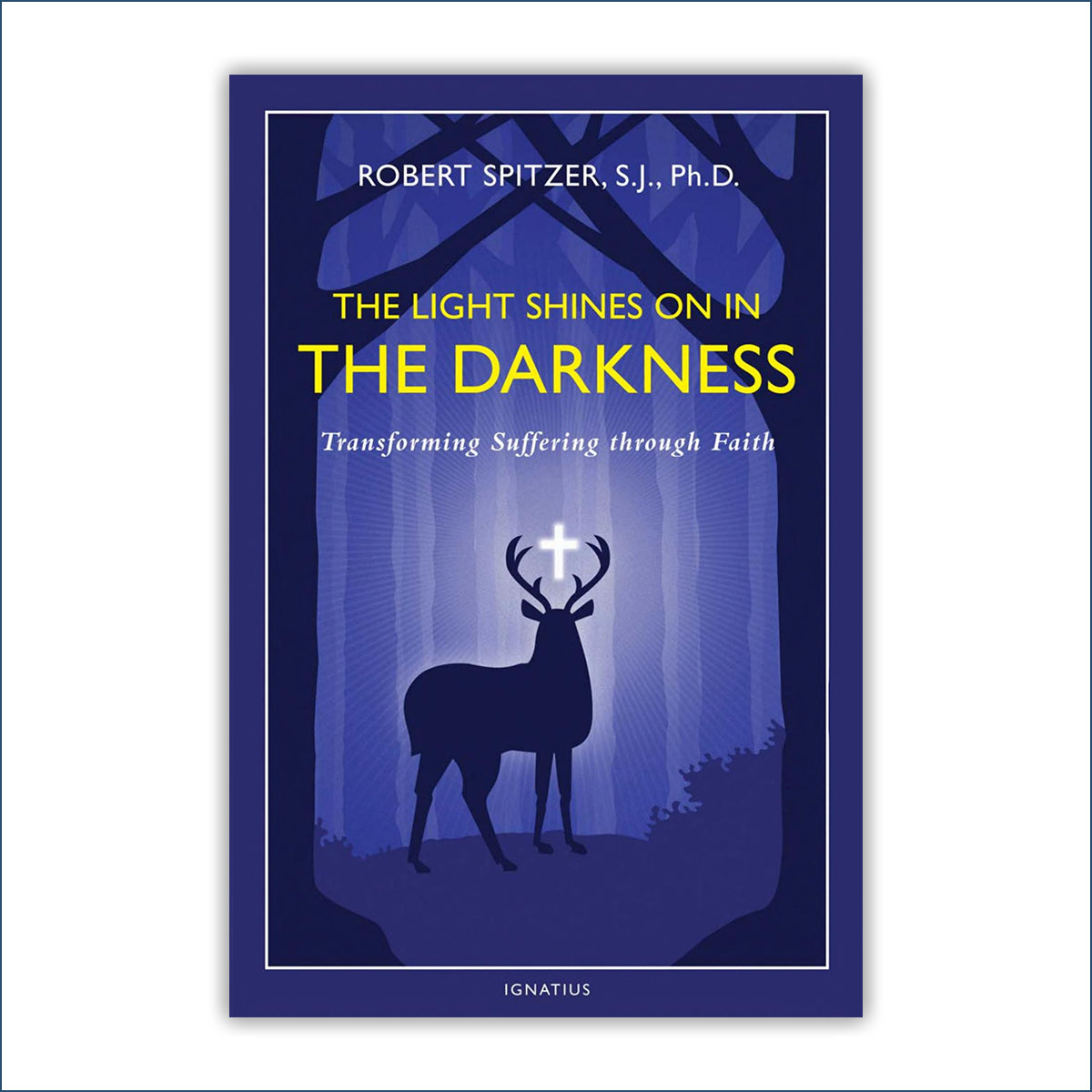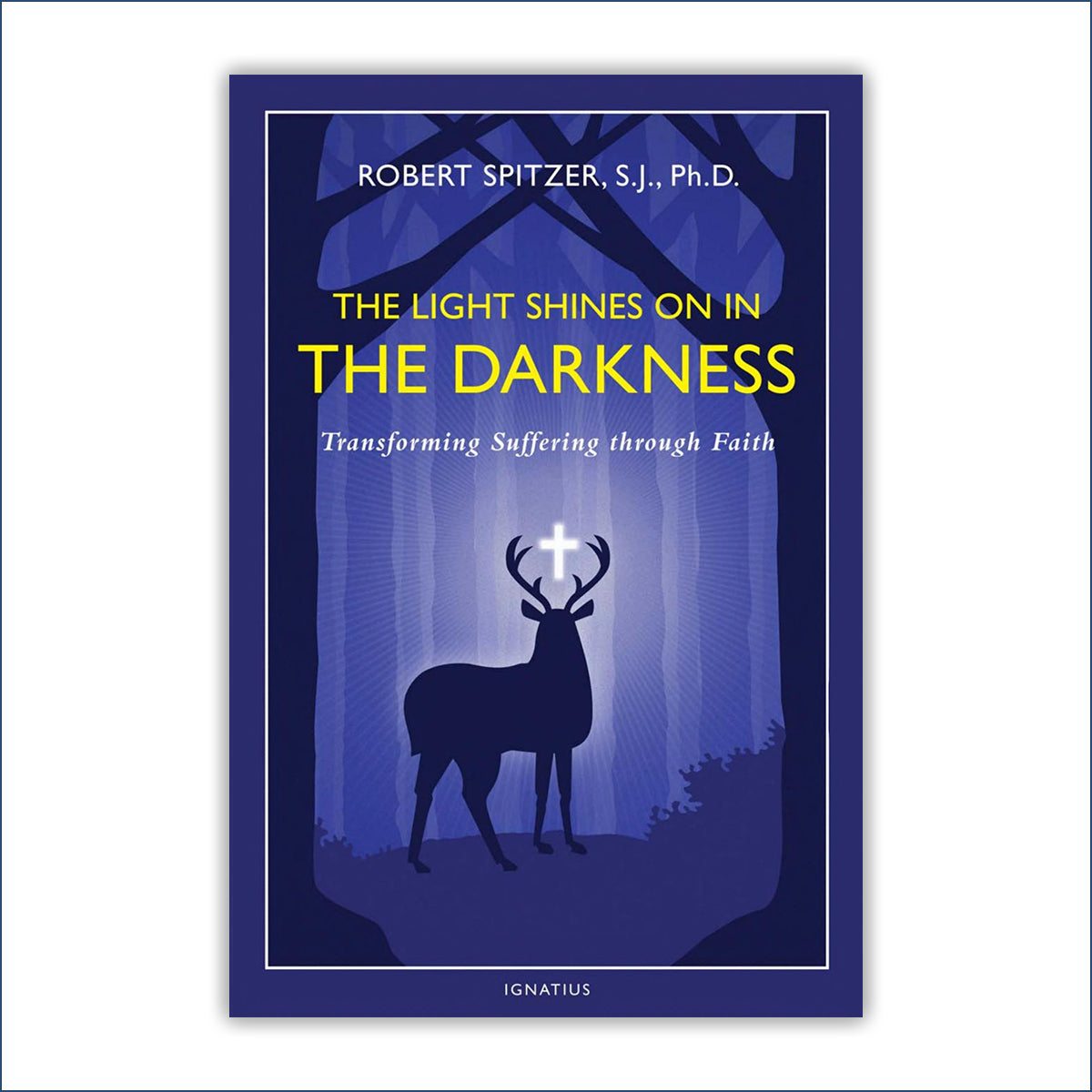
Here are some of Father’s own words from the introduction:
“Suffering is darkness—leading to light—if we let it. The darkness of suffering requires no explanation. We have all felt it in times of grief, pain, deprivation, physical weakness, psychological anxiety, setbacks, loss, and failure. Most non-masochists do not rejoice in the darkness of suffering. In its initial moments, it hurts, distresses, enervates, isolates, threatens, and discourages—obscuring and even eclipsing the light of love, joy, and peace that calls us to our true home.”
“There is no need to remain in the darkness, because we have been told by Jesus that there is light—love, joy, peace, and home—in every kind and instance of suffering—light that can transform us into a perfect reflection of God’s unconditionally loving nature. If we want to overcome the darkness—to transform it into even greater light than we experienced before the darkness, we will have to be able to see the light in the darkness—and then follow it…”
Fr. Robert J. Spitzer, S.J., Ph.D., is the former President of Gonzaga University. He is a philosopher, educator, author and founder and President of the Magis Center, an organization dedicated to education on the relationship among physics, philosophy, reason, and faith. He is Founder and President of the Spitzer Center which provides education on leadership and culture to Catholic organizations as well as ethical leadership to non-profit and for-profit organizations. Other books by Father Spitzer include: New Proofs for the Existence of God, Healing the Culture, Ten Universal Principles, Five Pillars of the Spiritual Life, and The Spirit of Leadership.
“With heart and intellectual verve, Fr. Spitzer explores why a loving God allows—must allow—pain. More important, he shows how suffering can teach us compassion, shape our character for the better, bring us closer to God, and in fact can be, as counterintuitive as it may seem, the ground out of which a greater happiness grows.”
— Dean Koontz, #1 New York Times
Best-selling Author
“Suffering has the power to break or elevate the human spirit. Lived in the spirit of the Gospel and borne for the sake of others, it’s the most redemptive, transfiguring force in creation. Fr. Spitzer has written a magisterial work on the meaning of suffering, a work remarkable both for its depth and beauty.”
— Charles J. Chaput, O.F.M. Cap.
Archbishop of Philadelphia
“In this trenchant and searching book, Fr. Spitzer responds to the most powerful objection to the proposition that God exists, namely, the problem of suffering. And he dares to do what very few are willing to do today: to articulate how evil and pain are ingredients in the providential design of a loving God.”
— Bishop Robert Barron
Host, Catholicism film series
“Fr. Spitzer draws not only from his singular intellect, but also from the deep well of his personal experience and suffering. God’s strength is made perfect in our weakness. It’s edifying to see how true this is even in a man of such stature. This book is ultimately about the personal crisis of suffering everybody goes through, but nobody’s prepared for. This book is invaluable.”
— Scott Hahn, Ph.D.
Author, Rome Sweet Home
Here are some of Father’s own words from the introduction:
“Suffering is darkness—leading to light—if we let it. The darkness of suffering requires no explanation. We have all felt it in times of grief, pain, deprivation, physical weakness, psychological anxiety, setbacks, loss, and failure. Most non-masochists do not rejoice in the darkness of suffering. In its initial moments, it hurts, distresses, enervates, isolates, threatens, and discourages—obscuring and even eclipsing the light of love, joy, and peace that calls us to our true home.”
“There is no need to remain in the darkness, because we have been told by Jesus that there is light—love, joy, peace, and home—in every kind and instance of suffering—light that can transform us into a perfect reflection of God’s unconditionally loving nature. If we want to overcome the darkness—to transform it into even greater light than we experienced before the darkness, we will have to be able to see the light in the darkness—and then follow it…”
Fr. Robert J. Spitzer, S.J., Ph.D., is the former President of Gonzaga University. He is a philosopher, educator, author and founder and President of the Magis Center, an organization dedicated to education on the relationship among physics, philosophy, reason, and faith. He is Founder and President of the Spitzer Center which provides education on leadership and culture to Catholic organizations as well as ethical leadership to non-profit and for-profit organizations. Other books by Father Spitzer include: New Proofs for the Existence of God, Healing the Culture, Ten Universal Principles, Five Pillars of the Spiritual Life, and The Spirit of Leadership.
“With heart and intellectual verve, Fr. Spitzer explores why a loving God allows—must allow—pain. More important, he shows how suffering can teach us compassion, shape our character for the better, bring us closer to God, and in fact can be, as counterintuitive as it may seem, the ground out of which a greater happiness grows.”
— Dean Koontz, #1 New York Times
Best-selling Author
“Suffering has the power to break or elevate the human spirit. Lived in the spirit of the Gospel and borne for the sake of others, it’s the most redemptive, transfiguring force in creation. Fr. Spitzer has written a magisterial work on the meaning of suffering, a work remarkable both for its depth and beauty.”
— Charles J. Chaput, O.F.M. Cap.
Archbishop of Philadelphia
“In this trenchant and searching book, Fr. Spitzer responds to the most powerful objection to the proposition that God exists, namely, the problem of suffering. And he dares to do what very few are willing to do today: to articulate how evil and pain are ingredients in the providential design of a loving God.”
— Bishop Robert Barron
Host, Catholicism film series
“Fr. Spitzer draws not only from his singular intellect, but also from the deep well of his personal experience and suffering. God’s strength is made perfect in our weakness. It’s edifying to see how true this is even in a man of such stature. This book is ultimately about the personal crisis of suffering everybody goes through, but nobody’s prepared for. This book is invaluable.”
— Scott Hahn, Ph.D.
Author, Rome Sweet Home

